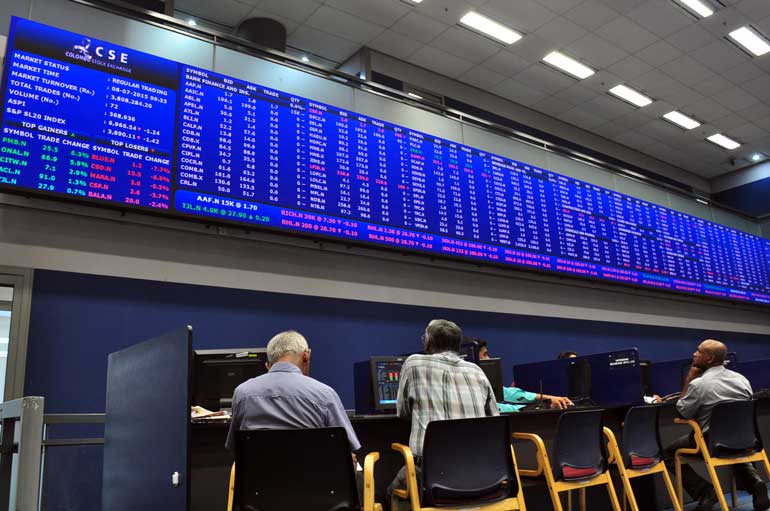Wednesday Feb 25, 2026
Wednesday Feb 25, 2026
Monday, 17 August 2015 00:00 - - {{hitsCtrl.values.hits}}
 Colombo Stock Exchange
Colombo Stock Exchange
Bloomberg: For financial investors, the bet on Sri Lanka’s election is simple: Sell if former President Mahinda Rajapaksa’s party wins. The Parliamentary vote on 17 August will be the first test at the polls since President Maithripala Sirisena defeated Rajapaksa in January to end his 10-year rule.
Now Sirisena needs his allies to win control of Parliament to ensure stability on the island nation best known for its beach resorts.
Rajapaksa, 69, is doing everything he can to spoil the party. He wants to make a comeback and replace Prime Minister Ranil Wickremesinghe, a scenario that may bring more strife to a nation that ended a bloody civil war in 2009.
A win for the current ruling coalition “will be taken positively by investors as that will mean continuance of the existing policies,” said Saurav Anand, South Asia Economist at Standard Chartered Plc. A majority for Rajapaksa’s party, however, may lead to a “further period of policy uncertainty”.
Political stability and soaring economic growth under Rajapaksa put Sri Lanka on the radar screen of global investors. The island’s benchmark stock index is among the top 10 best performers globally over the past decade when measured in total US dollar returns.
But resentment built among the public over moves seen to consolidate Rajapaksa’s power, enrich his family and shift the country under China’s orbit. The frustration boiled over last year, when Sirisena split with Rajapaksa and went on to defeat him in a presidential vote.
Upon taking power, Sirisena pledged to rollback Rajapaksa’s measures to enhance the president’s power. He reinstalled a two-term limit and diluted the head of state’s influence over the judiciary, military and bureaucracy. He also implemented a more balanced foreign policy.
Sirisena failed, however, to pass a constitutional amendment that would overhaul the voting system to make it more representative, prompting him to dissolve Parliament in June, almost a year before its term expired.
The uncertainty since Sirisena’s win has affected perceptions of Sri Lanka. Overseas investors have sold a net $ 5.3 million of Colombo-listed shares in the year to 12 August, compared with net foreign purchases of $159 million in 2014 and $165 million the previous year.
The split between Sirisena and Rajapaksa divided their Sri Lanka Freedom Party, which leads an alliance that controlled about two-thirds of the 225-member parliament. Some Sirisena allies jumped to Wickremesinghe’s United National Party.
On Monday, the vote will largely be split between the Wickremesinghe-led bloc and a coalition headed by Rajapaksa. While few opinion polls are reliable, an island-wide survey by the Colombo-based Centre for Policy Alternatives this month showed about 40% backing Wickremesinghe for prime minister, with 28% supporting Rajapaksa.
Rajapaksa’s camp rejects assertions that a victory for him would lead to instability. The former President said last month that he wants to help boost growth and restart projects suspended by the Sirisena administration, including a Chinese-funded $1.4 billion Port City, the largest foreign funded project on record.
“All people of this country can work with Mahinda Rajapaksa, including President Sirisena,” Manusha Nanayakkara, a spokesman for Rajapaksa, said by phone. “They have worked together for nearly 30 years.”
Expectations of a win for the incumbent parties have helped boost the Colombo All-Share Index. It’s risen 10% since hitting a 2015 low in March, and is up 2% this year. The rupee has depreciated about 2% in the year to 134 to the dollar.
A surprise win for Rajapaksa’s coalition, on the other hand, would set up a direct clash with Sirisena. The President has said that he won’t appoint his top foe as prime minister.
“The office would likely go to a different figure while Rajapaksa would hold most of the power, setting up continual clashes with Sirisena,” said Sasha Riser-Kositsky, Asia Associate at Eurasia Group. “Sri Lanka would face years of highly unstable governance.”